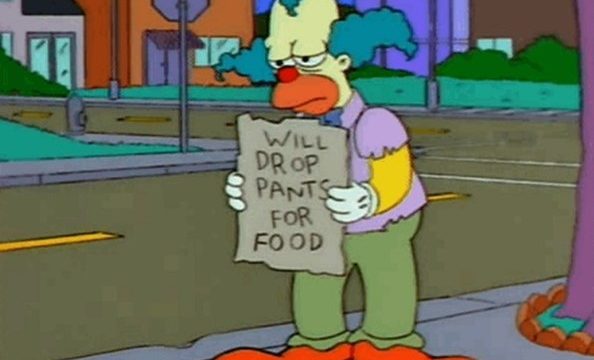We talk through pop culture. Don’t worry, I can use the royal “we” here because it’s true — just ask the annoying person who wouldn’t stop saying “Sit on it!” in the late 70s or “Yeah, baby!” in the late 90s. And at this site, I can get even more specific: We talk through The Simpsons. No other single work has infiltrated our language, and I would argue the broader language as well. That’s in part because of the sheer volume of material (which is not even half the actual output of the show at this point, unless people are dropping lines from seasons 13 to 34) and the variety of characters delivering it. But I think the manner of material is a major factor as well. There is a level of nuance within these words — and not-quite words — that makes them endlessly adaptable. Here, courtesy of Krusty the Klown, are four ways Simpsonsic language has become an indispensable part of communication.
- The Line
This is in some ways the most sophisticated Simpsonic device but also the least unique. The Line is something so clever that it can stand on its own, outside of Simpsons context. “Do we really want to live in a world without television? I think the survivors would envy the dead!” Krusty exclaims — this is because his medium is being threatened by a psychotic former sidekick with an atomic bomb, but that is unnecessary to appreciate the Line’s dark wit. You could use it as an epigraph, its brilliance speaks for itself — but to use it, you must first know it through the show. Many great works produce Lines, the ones The Simpsons contributes are part of that linguistic pool we pull from to add an outside voice to our own.
- The Concept
If the Line is a closed loop, ornamental, the Concept opens outward. It can be a word or a phrase, perhaps new or maybe just perfectly distilled. “Oops — I said the quiet part loud and the loud part quiet,” Krusty bemoans, and the first half of that formulation has become shorthand for describing a failed or overt dog whistle (itself a metaphorical concept). Similar to the Line, the Concept can come from any art — Seinfeld was arguably superior to The Simpsons in coining them — but it has more use and extends the world of the show into different contexts. It’s the difference between knowing the Lines of Hamlet’s “To be or not to be” soliloquy and mentioning suffering slings and arrows. Like Shakespeare’s words, Simpsons language seeps into use in different ways.
- The Reference
This is the all-purpose description of Simpsons-speak. Technically the Line and the Concept fall under this umbrella, although the Line is more of a citation and the Concept’s utility means people will use it without knowing its provenance, as Gillianren discusses in an excellent piece on orphaned jokes. I think the Reference is something different — it is a shibboleth, a way for people in the know to communicate using words and phrases that may be unique on their own but imbued with meaning via the show. “I heartily endorse this event or product” is the most generic of phrases but that is the joke of Krusty’s mercenary delivery, a person dropping it in reference to a real-life celebrity shilling crap or their own lack of enthusiasm regarding something is a way of speaking covertly. Of joking with the people who will get it. The Reference may not have the reach of the Concept but it makes the stronger connection, and those connections wind up expanding usage as well. It is a private language that anyone can join, and more than anything has kept the broader language of the Simpsons in circulation.
- The Utterance
But there is something perhaps more private. The Simpsons’ language is spoken as well as written, and the voice actors’ deliveries have made their own contributions off the page. The most famous of these of course is “d’oh!”, which Dan Castellenata transformed from the scripted [annoyed grunt] into a word that is now in the dictionary. “D’oh” is eternal, but what I may use even more as I get older is Castellanata-as-Krusty’s weary “ugggggggggh.” It’s the sound of dreading something you know you can’t avoid, of seeing an expectation of misfortune confirmed, of making a hefty down payment on future misery. It’s great! Although I have the decency to not do it around other people. The Utterance is a reaction but it’s not a thoughtless one. It’s a way of speaking to myself in a familiar voice, falling back on a language that has made me laugh before and is helpful as a way of processing something now.
What are your favorite Lines, Concepts, References, Utterances? How do you speak Simpsons, and pop culture in general?


